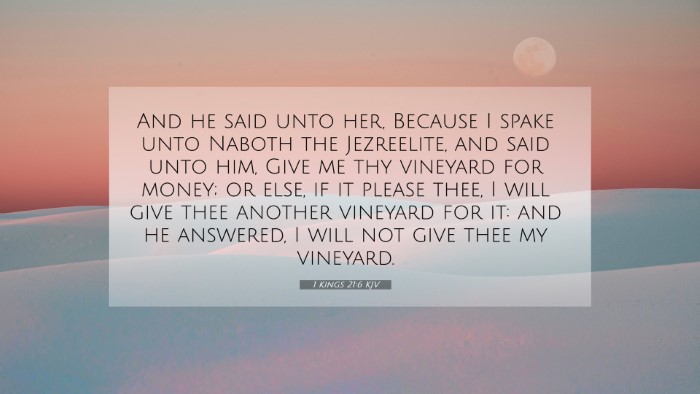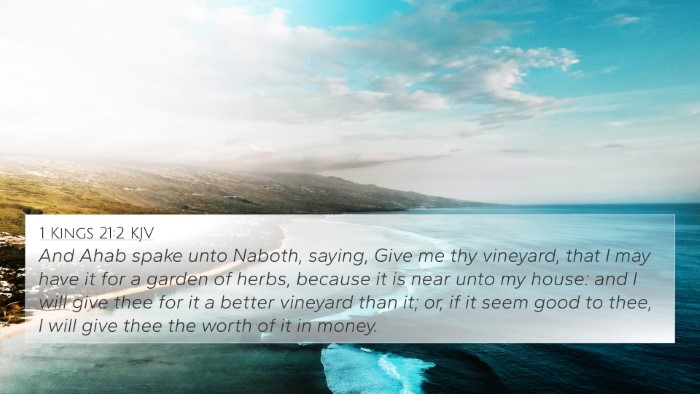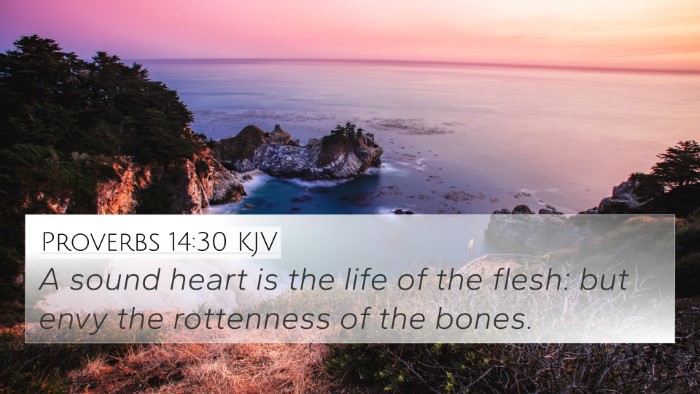Understanding 1 Kings 21:6
Verse: "And he said unto her, Because I spake unto Naboth the Jezreelite, and said unto him, Give me thy vineyard for money; or else, if it please thee, I will give thee another vineyard for it: and he answered, I will not give thee my vineyard."
Meaning and Interpretation
This verse encapsulates the tension between King Ahab and Naboth over a vineyard that Naboth owned. Ahab's entitlement as king clashes with Naboth's rightful ownership, highlighting themes of greed and injustice. The refusal of Naboth to sell his vineyard, which was his ancestral inheritance, points to the deeper values of loyalty to one’s heritage and the importance of rightful ownership, reflecting God’s commandments regarding property and justice.
Commentary Insights
-
Matthew Henry:
Henry focuses on Ahab's covetousness as a primary motivation for his request to Naboth. He notes that Ahab's actions demonstrate a lack of respect for God's laws, as Naboth’s refusal is rooted in the divine principles governing land ownership. Naboth's stance illustrates a moral high ground and fidelity to God’s commandments.
-
Albert Barnes:
Barnes emphasizes the legal and moral implications of Ahab's request. He points out that Naboth’s vineyard was not merely a piece of land, but a cherished family inheritance and ties his rejection to the wider context of Israel’s covenant relationship with Yahweh. The commentary draws attention to the belief that God’s eternal ownership of the land is reflected in human stewardship.
-
Adam Clarke:
Clarke discusses the sociocultural backdrop of this confrontation. He stresses how Ahab's authority as king did not grant him the right to undermine Naboth’s dignity or his land. He describes Naboth as a man of principle, whose resistance to Ahab signifies a broader commentary on loyalty, justice, and moral conviction against tyranny.
Thematic Bible Verse Connections
This verse relates to several important themes within Scripture, showcasing cross-references that enrich understanding:
-
Exodus 20:15: "You shall not steal."
This commandment echoes the unethical pursuit of Ahab to obtain Naboth's vineyard.
-
Leviticus 25:23: "The land shall not be sold in perpetuity, for the land is mine."
This verse underscores God's ownership of the land, emphasizing Naboth's righteous claim.
-
Proverbs 1:19: "Such are the ways of everyone who is greedy for unjust gain; it takes away the life of its possessors."
This serves as a moral warning against the greed exemplified by Ahab.
-
Micah 2:2: "They covet fields and seize them, and houses, and take them away."
This prophecy aligns with the actions of Ahab, illustrating a pattern of exploitation.
-
James 5:4: "Behold, the hire of the laborers... which is of you kept back by fraud, crieth."
This New Testament reference acts as a warning against unjust gain, reminiscent of Ahab's intentions.
-
1 Samuel 8:14: "And he will take your fields, and your vineyards."
This illustrates the risk of absolute power, paralleling Ahab's abuse of authority.
-
1 Timothy 6:10: "For the love of money is the root of all evil."
This reflects the internal corruption leading Ahab to approach Naboth with greed.
-
Lamentations 3:34: "To crush under his feet all the prisoners of the earth."
This notion of oppression can be connected to Ahab’s tyrannical desires.
-
Matthew 7:12: "So whatever you wish that others would do to you, do also to them."
Ahab's behavior contrasts starkly with this Golden Rule, urging self-reflection on one’s actions.
Spiritual Reflection
1 Kings 21:6 serves as a potent reminder of the dangers of ambition when it overrides moral integrity. The contrast between Ahab's unchecked desire and Naboth's steadfastness encourages believers to uphold justice and righteousness, even in the face of authority or oppression.
Tools for Bible Cross-Referencing
To further explore the connections between biblical texts and enhance understanding, consider the following tools:
-
Bible Concordance: A valuable resource for locating words and their occurrences across Scripture.
-
Bible Cross-Reference Guide: A handy reference to find verses that relate to one another, assisting in deeper study.
-
Cross-Reference Bible Study Methods: Recommended approaches for identifying and interpreting related verses.
-
Bible Chain References: A method for linking related verses in a thematic or narrative chain.
Conclusion
In conclusion, 1 Kings 21:6 not only presents a historical narrative but also invites readers to engage in the broader themes of justice, authority, and personal integrity. By examining related verses and employing tools for biblical study, one can gain a comprehensive understanding of its implications, fostering deeper spiritual insights and applications.








